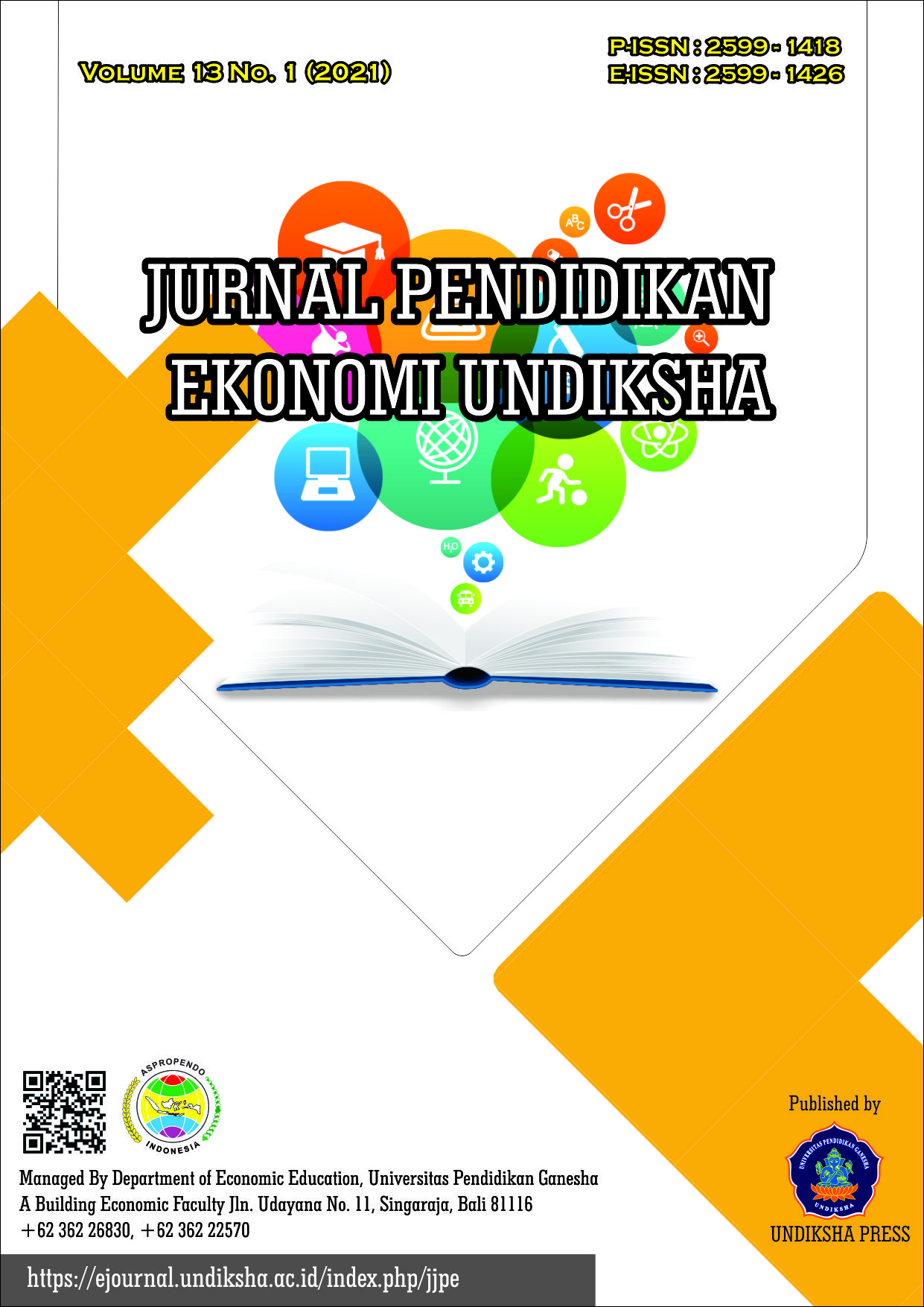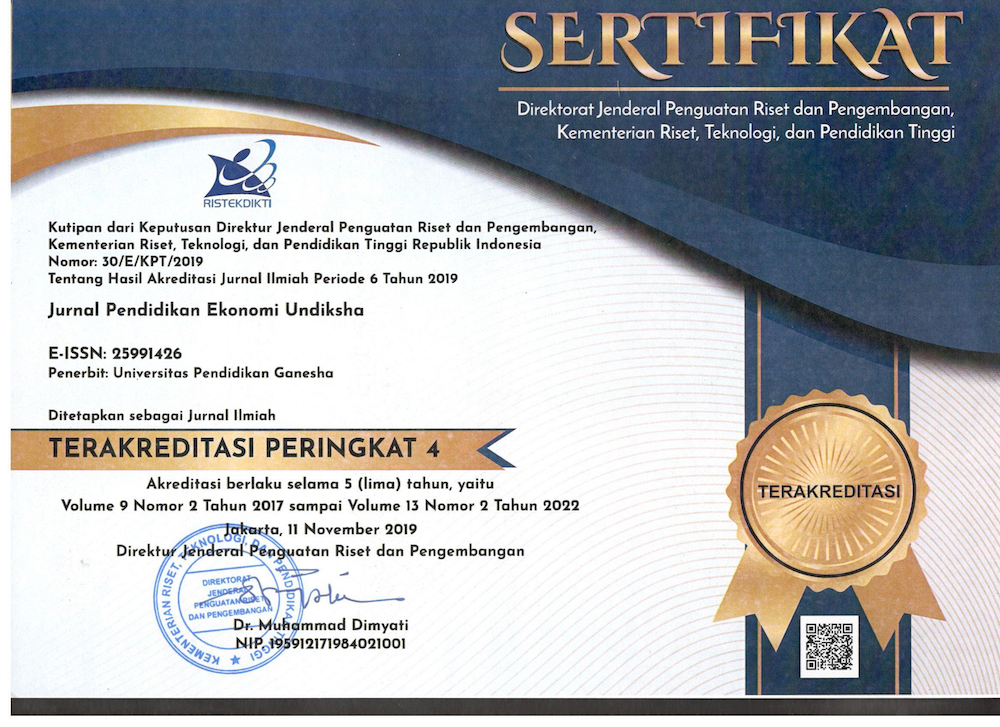Perilaku Berwirausaha Generasi Milenial di Era Pandemi COVID-19
DOI:
https://doi.org/10.23887/jjpe.v13i1.34551Kata Kunci:
millennial generation, entrepreneurial behavior, COVID-19 PandemicAbstrak
This study aims to study and reveal the entrepreneurial behavior of the millennial generation during the COVID-19 pandemic. This study is a study with a quantitative approach with survey techniques. Data collection was carried out using an instrument in the form of a questionnaire and completed with interviews with millennials who have businesses, in order to obtain a comprehensive picture of entrepreneurial behavior. There are four aspects measured in this study, namely entrepreneurial interest, creativity, innovation, and product marketing strategies carried out by millennials during the COVID-19 pandemic. The population in this study were millennials who have businesses and are domiciled in South Sulawesi Province, West Sulawesi Province and Southeast Sulawesi Province with purposive sampling of 31 people. The results of this study show that during the COVID-19 pandemic, the millennial generation still has an interest and enthusiasm for entrepreneurship. This is shown by even though they are currently in the era of the COVID-19 pandemic, millennials still have entrepreneurial behavior, such as creativity, innovation, and marketing strategies to sustain their business during the COVID-19 pandemic.
Referensi
Ajzen, I. (1991). The Theory of Planned Behavior. Organizational Behavior and Human Decision Processes, 50(2), 179-211.
Alfian, A. R., Qoumar, M. Q., & Alamsyah, D. P. (2019). Pengaruh Pendidikan Kewirausahaan dan Dukungan Akademik terhadap Niat Kewirausahaan Mahasiswa. Jurnal Kajian Ilmiah, 19(2), 175-181.
Christian, M. (2017). Pengaruh Faktor Perilaku Pada Kelompok Milenial terhadap Keinginan untuk Berwirausaha. Journal of Business & Applied Management, 10(2), 92-105.
Dinar, M., Ahmad, M. I. S., & Hasan, M. (2020). Kewirausahaan. Bandung: Media Sains Indonesia.
Filser, M., Kraus, S., Roig-Tierno, N., Kailer, N., & Fischer, U. (2019). Entrepreneurship as Catalyst for Sustainable Development: Opening the Black Box. Sustainability, 11(16), 1-18.
Fisher, G., Stevenson, R., & Burnell, D. (2020). Permission to Hustle: Igniting Entrepreneurship in an Organization. Journal of Business Venturing Insights, 14(1), 2-7.
Gunawan, A. (2020) Pelatihan Digital Entrepreneurship Mewujudkan Generasi Milenial Berjiwa Wirausaha di Sekolah SMA Desa Karangasih Cikarang. Jurnal Abdimas Kartika Wijayakusuma, 1(1), 38-45.
Hasan, K., Harniawati., Sufi., & Arifin, A. (2020). Millenial Enterpreneurship Creative Digital Economics Based on Aceh’s Local Achievements Pandemic Time COVID-19. Proceedings of the International Conference on Social Science, Political Science, and Humanities, 13-17.
Hasan, M. (2018). Pendidikan Ekonomi Informal: Bagaimana Pendidikan Ekonomi Membentuk Pengetahuan Pada Bisnis Keluarga?. JEKPEND: Jurnal Ekonomi dan Pendidikan, 1(2), 30-37.
Hasan, M. (2020). Literasi dan Perilaku Ekonomi : Transfer Pengetahuan Kewirausahaan dalam Perspektif Pendidikan Ekonomi Informal. Bandung: Media Sains Indonesia.
Hasan, M., Musa, C. I., Arismunandar, Azis, M., & Tahir, T. (2020). Positive Psychological Capital, Market Orientation, and Business Performance of Family Business in the Culinary Sector: a Research Study. Economics & Sociology, 13(3), 97-112.
Hasan, M., Hatidja, S., Rasyid, R., Nurjanna, N., Walenta, A. S., Tahir, J., & Haeruddin, M. (2020). Entrepreneurship Education, Intention, and Self Efficacy: An Examination of Knowledge Transfer within Family Businesses. Entrepreneurship and Sustainability Issues, 8(1), 526-538.
Hasan, M., Supatminingsih, T., & Ahmad, M. I. S. (2021). Koperasi & UMKM: Konsep dan Strategi Pengembangannya dalam Perspektif Kewirausahaan. Bandung: Media Sains Indonesia.
Hutagalung, B., Dalimuthe, D. M. J., Pambudi, R., Hutagalung, A. Q., & Muda, S. (2017). The Effect of Entrepreneurship Education and Family Environment Towards Students’s Entrepreneurial Motivation. International Journal of Economics Research, 14(20), 311-348.
Hutagalung, M. A. K., Fitri, R., & Sri, R. W. R. (2019). Generasi Muslim Milenial dan Wirausaha. Seminar Nasional Hasil Pengabdian Kepada Masyarakat STIMIK Pontianak, 300-304.
Israr, M., & Saleem, M. (2018). Entrepreneurial Intentions Among University Students in Italy. Journal of global Entrepreneurship Research, 8(20), 1-14.
Iswahyudi, M., & Iqbal, A. (2018). Minat Generasi Milenial untuk Berwirausaha. Jurnal Akutansi dan Pendidikan, 7(2), 95-104.
Kusasih, I. A. K. R., Mutmainan, H., & Kholis, N. (2020). Entrepreneurial Motivation during The Covid-19 Pandemic. KANGMAS: Karya Ilmiah Pengabdian Masyarakat, 1(2), 47-56.
Kusumawardhany, P. A., & Dwiarta, I. M. B. (2020). Enterpreneurial Intention Among Millenial Generation: Personal Attitude, Educational Support and Social Media. Journal Bussines and Management Research, 115(1), 63-68.
Liu, J. Z. Y., Serapio., M., & Tamer, C. S. (2019). The New Generation of Millennial Entrepreneures: A Review Call for Research. International Business Review, 28(5), 1-32.
Makridakis, S. (2017). The Forthcoming Artificial Intelligence (AI) Revolution: Its Impact on Society and Firms. Journal Futures, 90(1), 46-60.
Mogaji, E., Soetan, T. O., & Kieu, T. A. (2020). The Implications of Artificial Intelligence on the Digital Marketing of Financial Services to Vulnerable Customers. Western Journal of Nursing Research, 12(2), 747-759.
Nuraeningsih, R., & Indaryani, M. (2020). Empowering College Student
Entrepreneurship During the Pandemic for Economics Sustainability by Maximizing Digital Technologies. The 4th International Conference on Family Business and Entrepreneurship, 59-72.
Polas, M. R. H. & Raju, V. (2021). Technology and Entrepreneurial Marketing Decisions During COVID-19. Global Journal of Flexible Systems Management, 22(2), 95-112.
Putri, L. P., & Christiana, I. (2020). Analisis Faktor yang Mempengaruhi Mahasiswa Berwirausaha di Masa Pandemi COVID-19. Seminar of Social Sciences Engineering & Humaniora, 212-120.
Raza, S. A., Qazi, W., & Shah, N. (2018). Factors Affecting the Motivation and Intention to Become an Entrepreneur Among Business University Students. Journal Knowledge and Learning, 12(3), 221-241.
Ruiz-Rosa, I., Gutiérrez-Taño, D., & García-Rodríguez, F. J. (2020). Social Enterpreneurial Intention and The Impact of Covid-19 Pandemic: A Structutal Model. Sustanaibility, 12(17), 6970.
Saragih, R. (2017). Pembangunan Usaha Kreatif, Inovatif, dan Bermanfaat melalui Penerapan Kewirausahaan Sosial. Jurnal Kewirausahaan, 3(2), 26-34.
Setiartini, L. (2020). Determinant Analysis of Entrepreneurial Intention Among Millennial in Yogyakarta, Indonesia. International Journal of Small and Medium Enterprises, 3(2), 17-34.
Shobaki, M. J. A., Naser, S. S. A., Amuna, Y. M. A., & Talla, S. A. E. (2018). The Entrepreneurial Creativity Reality among Palestinian Universities Students. International Journal of Academic Management Science Research (IJAMSR), 2(3), 1-13.
Vuong, Q. H. (2019). Entrepreneurship: From Economic Complexities to Interdisciplinary Research. Journal Problems and Perspectives in Management, 17(1), 117-129.
Widyaningrum, M., Suryanti, D., Yuniati, M., Amini, R., & Nurmi. (2020). Inovasi Kewirausahaan di Masa Pandemi COVID-19. Jurnal Pengabdian Masyarakat, 1(3), 78-85.
Wiyono, H. D., Ardiansyah, T., & Rasul, T. (2020). Kreativitas dan Inovasi dalam Berwirausaha. Jurnal Usaha (Unit Kewirausahaan) Pendidikan & Non Pendidikan, 1(2), 19-25.
Wright, S. A., & Schultz, A. E. (2018). The Rising Tide of Artificial Intelligence and Business Automation: Developing an Ethical Framework. Journal Business Horizons, 61(6), 823-832.
Yusuf, E., & Efendi, R. (2019). Student Entrepreneurial Interests that are influenced by Income Expectations, Entrepreneurship Education, and Self Efficacy. International Journal of Multicultural and Multireligious Understanding, 6(6), 572-580.
Zhang, S. X., Liu, J., Jahanshahi, A. A., Nawaser, K., Yousefi, A., Li, J., & Sun, S. (2020). At the height of the Storm: Healthcare Staff’s Health Conditions and Job Satisfaction and their Associated Predictors During the Epidemic Peak of COVID-19. Journal Brain, Behavior, and Immunity, 87(1), 144-146.





